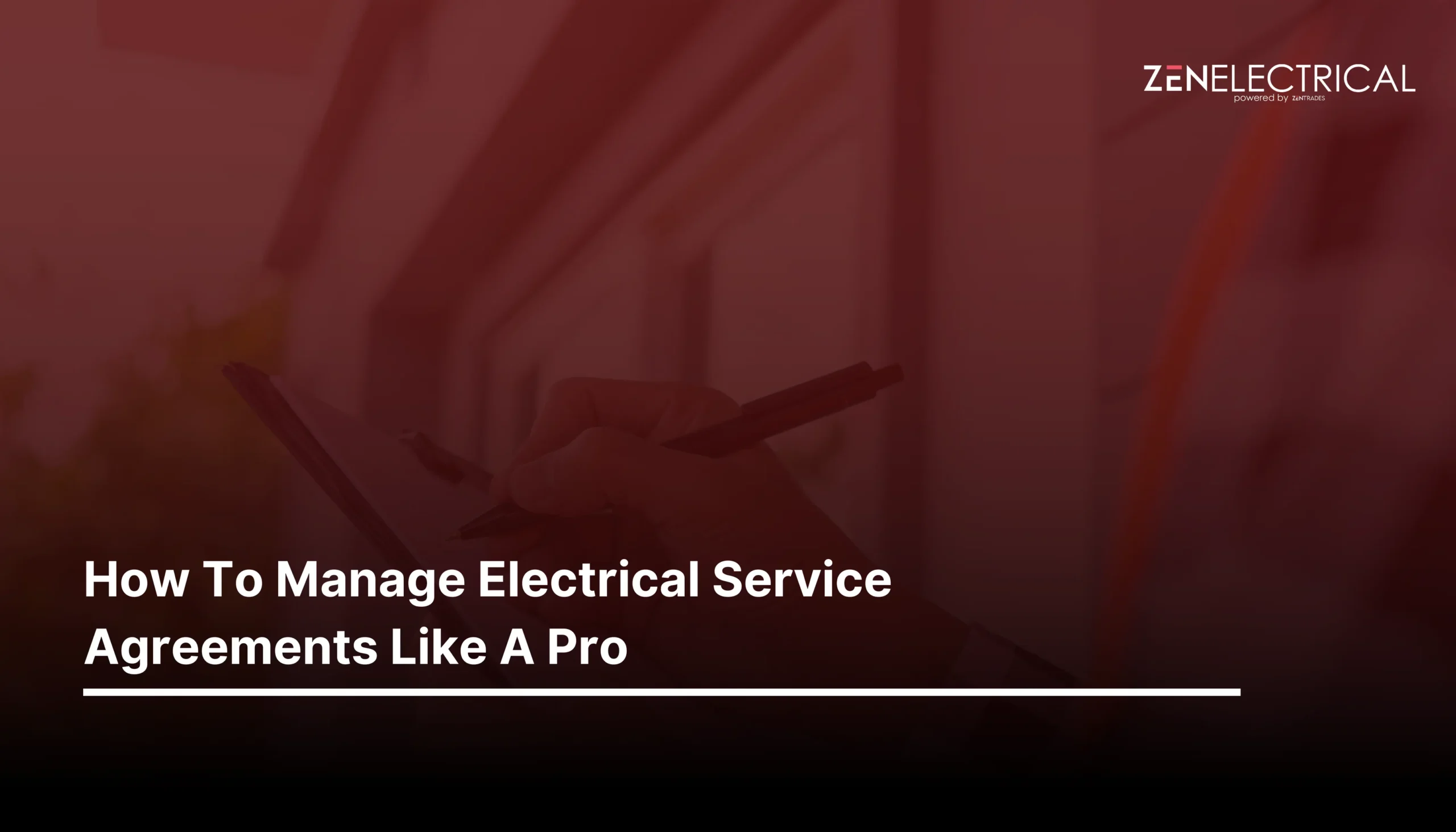
- An electrical contractor license lets you bid on projects, hire employees, and grow your business legally.
- Licensing rules vary by state—missing a requirement could delay your approval.
- You need years of hands-on experience before applying—know the exact steps.
- Surety bonds and insurance are mandatory—skip them, and your application gets rejected.
- Licenses expire every 2–3 years—forgetting renewal means losing business opportunities.
With the rise in technological advancements and the introduction of cutting-edge technologies, the demand for electrical workers has grown considerably. According to the U.S. Bureau of Statistics, it is projected to rise by a staggering 6% each year by 2030. Electricians play a major role in our lives and are always at our rescue whenever we encounter difficulties with our electrical installations, equipment, and systems. They perform electrical work and provide electrical services with extensive expertise and confidence, giving us the peace of mind that our systems are in safe hands and also keeping our safety in mind.
Even though gaining a master electrician license can help you advance yourself in your career and get your hands on bigger projects, obtaining an electrical contracting license can boost your career significantly and provide you with additional benefits that a general electrical license might not. Not to mention the obvious, it allows you to start your own electrical contracting business.
In this blog post, we will discuss the importance of an electrical contractor license, what it is, and how it can benefit electricians in the course of their careers. We will also cover eligibility aspects and how to obtain your license in a few easy steps.
Table of Contents
What Is An Electrical Contractor License?
Electrical contractor licensing is a requirement for an electrical contractor business owner. The licensing enables electricians to bid on electrical projects and conduct installation, repair, and maintenance work as a part of the electrical business. As a licensed electrical contractor, you are eligible to hire employees for your office, assign technicians for different electrical projects, sell your services, pricing estimations and set pricing structures for them and other business operations to run their electrical contractor company. They are also responsible for providing essential insurance such as liability insurance and workers’ compensation insurance.
We will learn more as we move forward, but first, let us understand the benefits you can avail yourself of after obtaining your electrical contractor license.
Benefits Of Becoming A Licensed Electrical Contractor
You need an electrical contractor license to provide electrical services. Most states mandate electricians to obtain their licensing before providing electrical services to customers or starting their own electrical contractor company. The licensing proves that the electrician fulfills the expertise and experience requirements needed to start a business or provide services.
Not obtaining your license, with respect to the regulations of certain states, can make you liable for a fine or penalty fee and can also lead to jail time. So, make sure you get familiar with the state’s standard regulations with regard to licensing requirements for starting your own electrical contractor business.
Eligibility Criteria For Electrical Contractors
The first and foremost criterion for becoming a licensed electrical contractor is establishing yourself as a licensed electrician with extensive practical experience. Or, more preferably, a master electrician license. To start your own electrical contractor business, you need to follow the same steps as aspiring electricians trying to reach the master electrician steps.
Let’s briefly understand the steps to become a licensed electrical contractor:
Step 1: Minimum 18 years of age
You must be at least 18 years old to be an electrician or start working in the electrical field. Even though apprenticeship programs allow students as old as 16 years to enroll in their apprenticeship programs, it is because apprenticeship programs take 4 to 5 years to complete. You can start working as a journeyman electrician at the age of 20.
Step 2: High School Diploma
You need basic primary education qualifications, such as a high school degree or a GED. This ensures that you have a proper educational background and knowledge base to enable you to learn complex topics in the coming years. Focusing on subjects such as maths, English, and science can help you build a strong base of logic and reasoning, which can prove beneficial in the long run.
Step 3: Apprentice Electrician
This is the first step you take to become an electrician. Depending on your requirements and preferences, you can either get into an apprenticeship program or a trade school. Trade schools take 2 to 3 years to complete their courses, while apprenticeship programs provide classroom training and on-field work experience where you can earn while studying. To qualify as an apprentice electrician and jump to the next level, you need a minimum of 500 hours of classroom instruction along with 8000 hours of practical experience. Only then will you be eligible to sit for the journeyman electrician license examination.
Step 4: Journeyman Electrician
After passing your licensing examination, you are now eligible to work as a journeyman electrician and handle projects with or without the supervision of a master electrician. As a journeyman electrician, you need an additional 4000 hours of on-field experience to advance to the next level. Which means working for a minimum of 2 years. Furthermore, you need to ace your master electrician license test to become a full-time senior-level electrician.
Step 5: Master Electrician
Achieving the master electrician status means you have achieved the highest level of certification in the electrician job. It also signifies that you are now competent and experienced enough to be your own boss and start your own electrical contracting business. Of course, you have to take your electrical contractor licensing examination to get your license. However, reaching the master electrician step is half the work done toward being a licensed electrical contractor.
Electrical Contractor License: How To Apply
The rules and regulations for applying for electrical contracting licenses vary from state to state. Depending on your region or area, the process might vary minutely. But here’s an overview of the general steps you can take to apply for your contracting licensure:
Step 1: Provide Relevant documents
You need to prepare relevant documents to fill out your licensing application. These documents can include:
Electrical contractor examination pass certificate
Proof of work experience
Educational Qualifications
Depending on the requirements of your state, document requirements can differ. The ones mentioned above are the most-asked-for documents. They can also ask you to submit your vehicle ownership certificate or a driver’s license, drug test pass certificate, and other relevant documents.
Step 2: Fill Out The Licensing Application
Obtain the electrical contractor licensing form from your state’s licensing board website. Fill out the application carefully, making no errors and ensuring all information is up-to-date. Attach the required documents to the form and ensure you don’t miss out on any vital information that can delay your licensing process. Or worse, cancel your licensing application.
Step 3: Secure Surety Bond
Many states mandate the process of obtaining surety bonds to provide financial protection if you fail to complete your client’s project. The minimum bond amount requirement varies depending on the area in which you wish to provide service. You must also provide proof of the surety bond in your licensing application.
Step 4: Purchase Insurance
Obtaining general liability insurance is a requirement for most states. It is vital to provide protection against claims of property damage or injury that can occur as an electrical contractor. Similar to surety bonds, the insurance’s minimum requirement depends on the area or region. You will also need to attach the proof of insurance to your licensing application.
Step 5: Submit the application
You must pay a small fee to submit your electrical licensing application, which can differ from state to state. The final step is to pay the fee and submit your application, attaching the necessary documents.
Electrical Contractor License: How To Apply
The rules and regulations for applying for electrical contracting licenses vary from state to state. Depending on your region or area, the process might vary minutely. But here’s an overview of the general steps you can take to apply for your contracting licensure:
Step 1: Provide Relevant documents
You need to prepare relevant documents to fill out your licensing application. These documents can include:
Electrical contractor examination pass certificate
Proof of work experience
Educational Qualifications
Depending on the requirements of your state, document requirements can differ. The ones mentioned above are the most-asked-for documents. They can also ask you to submit your vehicle ownership certificate or a driver’s license, drug test pass certificate, and other relevant documents.
Step 2: Fill Out The Licensing Application
Obtain the electrical contractor licensing form from your state’s licensing board website. Fill out the application carefully, making no errors and ensuring all information is up-to-date. Attach the required documents to the form and ensure you don’t miss out on any vital information that can delay your licensing process. Or worse, cancel your licensing application.
Step 3: Secure Surety Bond
Many states mandate the process of obtaining surety bonds to provide financial protection if you fail to complete your client’s project. The minimum bond amount requirement varies depending on the area in which you wish to provide service. You must also provide proof of the surety bond in your licensing application.
Step 4: Purchase Insurance
Obtaining general liability insurance is a requirement for most states. It is vital to provide protection against claims of property damage or injury that can occur as an electrical contractor. Similar to surety bonds, the insurance’s minimum requirement depends on the area or region. You will also need to attach the proof of insurance to your licensing application.
Step 5: Submit the application
You must pay a small fee to submit your electrical licensing application, which can differ from state to state. The final step is to pay the fee and submit your application, attaching the necessary documents.
What's Next?
Once you’ve submitted your electrical contracting license application, it’s time to wait for approval. The approval process can take from a few days to a few weeks. The board ensures that all the required documentation and proofs have been submitted with proper information in the application form. In some cases, the state board can conduct a background check as part of the process.
Once your application is approved, the licensing board will issue your electrical contractor license. The license comes with a unique number that you must provide in your business materials or other business collaterals.
Remember To Renew Your Contractor License!
Electrical contractor licenses are valid for 2 to 3 years, subsequent to which you will need to renew them. The process is simple and similar to the application procedure for obtaining your license. You need to fill out and submit a license renewal application notice before your current one expires. Additionally, you must keep updating yourself in your field and maintain your insurance and bonds to be eligible for your renewal application approval.
Get Insights Delivered Straight
To Your Inbox!
Related Reading
Why Your Field Software Management Software Needs QuickBooks Integration
ZenTrades Why Your Field Service Management Software Needs QuickBooks Integration Read More Request Demo...
Read MoreZenTrades How To Manage Electrical Service Agreements Like...
Read MoreZenTrades The Best 5 Jobber Alternatives In 2023...
Read More



